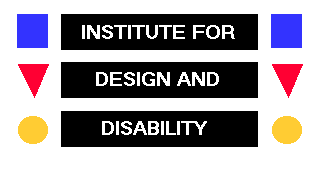
Good design enables,
bad design disables
A non-profit-making foundation contributing to the participation of people with disabilities through design
Design is a pervasive factor in the lives of people with disabilities.
It determines their immediate environment, the clothes they can wear,
the tools they can use, the work they can undertake, the buildings they can
enter and the forms of transport they can avail of.
Deficiencies in industrial design and the built environment are
widespread and press heaviest on old people and people who are disabled in
various ways.
Until comparatively recently, the tendency was to view people with
physical and sensory disabilities as dependent on others: today the emphasis
is on designing environments and products that help integrate people into the
community and enable them to live independently. People with disabilities represent between ten and twenty per
cent of the population, and recognition of their needs is creating new
challenges and opportunities for designers of all kinds.
Variously referred to as universal design, inclusive design, barrier-free
design and design for all, this new approach to design is directed towards the
greatest number of users including: people of all ages, mobile and
wheelchair-users, right and left-handed, sighted and blind people, the
temporarily disabled and the permanently incapacitated.
Contact with the consumer is essential, and it is clear that if
designers, people with disabilities, rehabilitation professionals and carers
can be brought into a coalition to address questions of design, spectacular
advances can be made.
The aim of the Institute for Design and Disability is to contribute to
this coalition by providing a focus for design effort and promoting interest
and awareness of the need for higher standards of design in favour of people
with disabilities.
Since its establishment ten years ago, the Institute’s membership have
been involved in projects to raise standards of design in products, transport
and buildings. Through its
programme of educational initiatives, meetings and campaigns, the Institute
has helped raise awareness in Government and among the general public of the
need for more responsive design. It
is the only national organisation dedicated to design and disability and is
recognised in internationally as the representative Irish body in this area.
Constitution
The Institute was established in 1991 as a non-profit-making charitable foundation. Its purpose is to contribute to the participation of people with disabilities through the application of design.
Objectives
The objectives of the Institute are to:
1.
Promote interest in design as a response to disability,
2.
Undertake studies of the relationship between design and disability,
3.
Develop design solutions to meet identified needs.
Membership
Membership of the Institute is open to individuals and comprises
designers, people with disabilities, rehabilitation scientists and other
professionals who participate actively in the work of the organisation, and
others who support its objectives and activities.
There is an annual subscription and persons wishing to become members
apply to the Honorary Secretary.
Management
The Institute is managed by a board of directors elected annually by the
membership.
Activities
The Institute pursues its objectives through an annual programme of
professional and promotional activities.
Under its Constitution, the Institute may:
- Carry
out studies and research into various aspects of design and disability;
- Organise
national and international meetings for designers and other professionals
to share experiences and raise overall design standards;
- Sponsor
without-profit design competitions and award schemes and publicise the
results;
- Organise
exhibitions and publish and distribute information and other material
concerned with design for people with disabilities
- Conduct
seminars and courses for designers and design students engaged in the
field of design for disability.
Co-operation with other bodies
The Institute works closely with statutory, voluntary and professional
bodies to achieve its objectives. It
maintains close links with the Institute of Designers in Ireland and the Royal
Institute of the Architects of Ireland and co-operates with the National
Disability Authority, the Forum of People with Disabilities, People with
Disabilities in Ireland, the Centre for Independent Living and the Equality
Authority.
International relations
The Institute is the Irish member organisation of the European Institute for Design and Disability (EIDD). Through the EIDD, it has liaison arrangements with the European Parliament and Commission, the European Disability Forum, and sister organisations in 15 countries. The Institute is responsible for the promotion in Ireland of the Barcelona Declaration, the principal European Convention on accessibility.
Finance
As a non-profit-making charity, the Institute is dependent on the
subscriptions of its members, grants, sponsorship and revenue from its
activities. Donations and
bequests are welcome and qualify for tax relief.
Further information and membership application forms from:
Honorary Secretary
Institute for Design and Disability
National College of Art and Design
100 Thomas Street
Dublin 8
Telephone
Facsimile
Email secretary@idd.ie
Website
www.idd.ie
Recognised as a
charity by the Revenue Commissioners, No. CHY 10515
Click here to download a copy of the IDD information sheet.